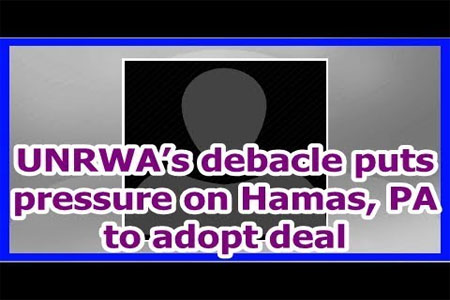
Afrasianet - Osama Al Sharif - In war and peace, the beleaguered Gaza Strip features as a hot trigger for both. The US and Israel are trying to change the status quo in the strip that came about after Hamas became its de facto ruler following a coup against the Palestinian Authority (PA) in 2007. That event delivered a tight economic blockade by Israel, and led to three major offensives and a number of confrontations that claimed the lives of thousands of Palestinians and destroyed much of Gaza’s infrastructure.
With worsening humanitarian conditions threatening the lives of 2 million Palestinians, US President Donald Trump’s administration has made things worse for Gazans by suspending payment of $300 million to UNRWA, the UN body responsible for the welfare of Palestinian refugees in Gaza, the West Bank, Jordan, Syria and Lebanon. The timing and motive of the move could not be worse for the Palestinian leadership in Ramallah and for the Palestinian cause. The US also suspended aid to the PA to put pressure on President Mahmoud Abbas.
UNRWA’s mandate could only end once a just and lasting settlement to the plight of Palestinian refugees and the displaced is solved. After decades of fruitless negotiations between the Palestinians and Israel, the right of return; a key issue in the final status talks, was as untenable as the future of East Jerusalem and Israel’s withdrawal from the West Bank and Gaza.
Under the Trump administration, a new US-Israeli approach towards dismantling the Palestinian question was adopted. Defunding UNRWA and forcing it to end its vital operations is now a cornerstone of that new approach. In the view of both Israel’s right-wing government and the White House, the problem of Palestinian refugees should be transferred to the United Nations High Commissioner for Refugees (UNHCR); effectively ending UNRWA’s unique status. Along these lines, the refugee issue would be deconstructed and dealt with separately and in a case-by-case manner. Palestinian refugees in Jordan, Lebanon and Syria would be settled in host countries, while Gaza, where the majority of the population is refugees, would be dealt with as part of a humanitarian-economic solution.
But for the Gaza part, which is a priority, to go into action Hamas must be weakened, threatened and then wooed into a adopting an open-ended truce with Israel. It must also embrace a deal with President Abbas that would allow the PA to assume full control of Gaza. In return, Hamas would be removed from the US terror list and become a partner in a major economic rehabilitation project for Gaza; one that would lift the blockade, open border crossings, restore essential services, build a new sea port and allow access to an airport in Sinai, among other incentives.
These are the main components of an economic solution for Gaza. And following weeks of Israeli strikes and threats of a major scale military operation, Hamas’ political leadership has chosen to engage in indirect negotiations with Israel via Egypt and the UN Middle East Envoy Nickolay Mladenov towards striking a deal. Israeli Prime Minister Benjamin Netanyahu was quoted as informing his Cabinet ministers that a new initiative will soon be launched for a diplomatic solution in Gaza. But Hamas is, yet, to make up its mind on both the reconciliation issue and the long-term truce with Israel. Time is not on its side, as the situation in Gaza gets worse.
Last week, UNRWA announced a 13 per cent cut in jobs that are part of its emergency programme in Gaza and the West Bank. Many social, educational and health related services will be affected as a result. These cuts involve the period between July and September and more cuts may take place before the end of the year.
Regardless of what the US and Israel have in mind for Gaza and the question of Palestine refugees in general, it is inconceivable that UNRWA will be allowed to die a slow death. Its role in Jordan and Lebanon, two countries that are going through tough economic conditions, is more important than ever, and in Syria, where Palestinian refugees suffered as a result of horrific fighting in Yarmouk refugee camp near Damascus earlier this year is crucial. In Gaza more than 60 per cent of Gazans rely on food coupons provided by UNRWA.
Last week, UNRWA spokesman Sami Mshasha said that in the West Bank, the money-for-work activities would be suspended by the end of July, while the distribution of food coupons would be halted by year end, the psychological assistance programme would be terminated at the end of August and work at the mobile clinics would be stopped by the end of October.
It is difficult to understand why Arab, Muslim and western countries have failed to mobilise in order to salvage UNRWA’s services. Defunding the agency is a major crime against millions of Palestinians who have already paid a high price for generations. One can understand the US and Israeli motives, which are one and the same, but for the rest of the world to do nothing is simply shocking and frustrating. Palestinian refugees are now pawns in a dirty political scheme.

